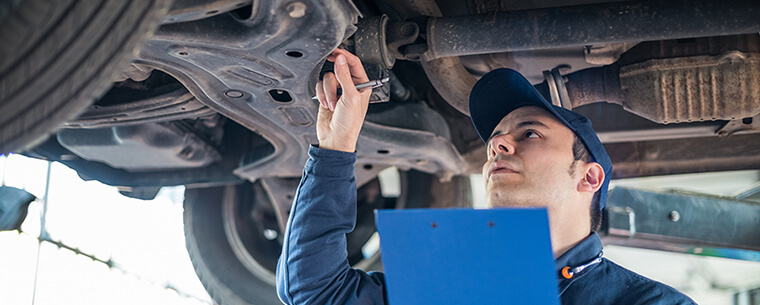Is Your Vehicle MOT Check Ready? Check Now
| Monday 21st January 2019 3:30pm

With changes to the MOT test coming into force in May last year, make sure that you aren’t caught out by being aware of how the different regulations affect whether your vehicle passes or fails. As tougher regulations come into force, it is more important than ever to look after your vehicle.
In order to pass the new MOT test, it is vital for you to understand how the test works and which problems could cause your car to fail. In this article, we discuss how the MOT test has changed and how you can prepare your vehicle for it to avoid a fail.
May 2018 MOT test changes
Although the latest MOT changes have been effective since May 2018, their full effect will begin to be felt from now on. There are five significant changes which affect whether your vehicle will pass or fail. These are:
1. Tougher emissions standards for diesel vehicles
If you drive a diesel vehicle, your emissions will be tested to comply with MOT test requirements. Many diesel vehicles are fitted with a filter which helps to reduce the exhaust emissions of the vehicle. Vehicles fitted with this filter, known as a diesel particulate filter (DPF), will be checked for visible smoke.
If any smoke can be seen, the vehicle will be classed as having a major fault – which means an automatic MOT failure. In addition, if the inspection finds that the DPF has been altered, the vehicle will also fail its MOT check.
2. New look MOT certificate
The MOT certificate itself has been re-designed to make it easier for motorists to understand the results for their vehicle. The latest version will list all defects under the new categories to make the results clear for drivers to understand.
3. Older vehicles
Any vehicle manufactured before 1960 was already exempt from having to undergo the MOT test. This has been extended to include vehicles registered forty years ago or longer. This means that vehicles first registered in 1979 are now also exempt. However, there are exceptions to this rule relating to vehicles that have been significantly modified in the last thirty years.
4. Vehicle defects
The way that MOT defects are categorised has changed. They are now classed as either Minor, Major, or Dangerous. Minor defects will still allow you to pass the MOT test but if your vehicle has any Major or Dangerous faults, it will automatically fail. You can find out which defects fall into each category here.
5. New checks
New checks have also been introduced on the following areas:
• Ensuring that brake fluid isn’t contaminated
• Fluid leaks that might be an environmental risk
• Reversing lights and whether they are functioning correctly
• Brake pad warning lights functioning correctly as well as if brake pads or discs are missing
• Brake pad warning lights working, as well as if any brake pads or discs aren’t present
• Ensuring that headlight washers are working on vehicles which have them fitted
• Headlight washers working on vehicles which came into use from 1st September 2009
• Daytime running lights on vehicles from 1st March 2018.
• Identifying underinflated tyres
Failing for underinflated tyres is easy to avoid if you regularly inspect your tyres. Research shows that 10% of MOT failures are because of issues with tyres. Tyre issues are easy to avoid if you carry out some simple checks yourself before your MOT test.
Why might your tyres cause an MOT check failure?
Tyres can cause an MOT failure for various reasons. Some of which are detailed below:
• Tread depth – being aware of the legal minimum tread depth and checking whether your tyres meet it can help avoid MOT failure for this issue.
• Inflation – over or under inflated tyres can be dangerous to drive on and can cause an MOT failure.
• Tyre damage – is it important to regularly inspect your tyres for any signs of damage before it becomes worse and more costly to replace.
• Part Worns – second hand tyres are more likely to fail an MOT check in comparison to new, premium tyres.
Which tyres are right for you?
Premium tyres, such as those manufactured by Continental, can be a good option for strong performance and longevity, which decreases the risk of MOT failure due to tyre defects. If your vehicle is due an MOT check, you can book online here with your local Kwik Fit centre.
Any facts, figures and prices shown in our blog articles are correct at time of publication.
Featured Articles
Is it Illegal to Drive With One Headlight?
Saturday 19th July 2025
Wondering if it’s illegal to drive with one headlight? Learn about the safety risks and penalties of illegal blown bulbs and why you should fix them promptly.
Air Con in EVs & Hybrids: Experts Answer Your Questions
Monday 30th June 2025
Does air con drain EV batteries? Can you use the air con while charging an electric car? Find out the answers to these questions & more from Kwik Fit’s experts.
Why Is Your Car Making a Noise? Fixes & Tips
Friday 13th June 2025
When your car starts making unexpected noises, it can certainly be quite disconcerting; it may be nothing to worry about, but here’s what you need to know.









